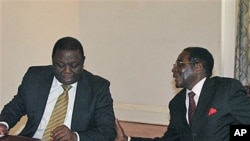The deputy chairman of the National Constitutional Assembly in South Africa’s capital, Pretoria, told VOA the European Union “betrayed oppressed” Zimbabweans after the EU dropped sanctions against 35 allies of President Robert Mugabe.
George Mkwananzi said many Zimbabweans are shocked and disappointed that the European Union will revise its sanctions, in his words, to the detriment of the victims of ongoing violence allegedly perpetrated by supporters of President Mugabe’s ZANU-PF party.
“The European Union is making a serious blunder by scaling down and even reducing the numbers of those people who are on the sanctions list at a time that we expect them to be increasing the list and tightening even the conditions of the sanctions because there is nothing really to reward there at home (Zimbabwe),” said Mkwananzi.
“When you take some people off the sanctions, you are actually saying that you have done a good job, we have seen some significant progress. But, in this case, we have seen the reversal of what has been considered as progress. So, this move may have been ill-timed.”
The individuals were on a list of people banned from traveling to the EU and whose assets in the bloc were frozen because of their ties to the Zimbabwean leader. The EU extended the sanctions for another year on 163 people, including Mr. Mugabe, and 31 businesses.
Mkwananzi said the European Union committed, in his words, a serious gaffe by lifting sanctions against Mr. Mugabe’s allies.
“When you witness an upsurge in violence, at a time when things are supposed to be cooling down in preparation for elections, when you expect the process of constitution-making to be teetering towards a conclusion, which is going to create grounds for election which is going to be free and fair, you have this which, in fact, is the opposite and nemesis of what one will consider conditions that are ripe for elections,” said Mkwananzi.
“You cannot reward such a situation. I don’t know what kind of lenses these people (EU) are using, which gives them such a bleared vision of the situation in Zimbabwe.”
EU foreign policy Chief Catherine Ashton said Zimbabwe has made “significant progress” toward addressing its economic crisis and delivering basic services to its citizens. However, she said political reforms in Zimbabwe have not kept pace, and said she was deeply concerned about a recent surge in violence, mainly in the capital, Harare.
The ZANU-PF and Movement for Democratic Change (MDC) formed a contentious power-sharing government in 2009 after disputed elections. President Mugabe has proposed that new elections be held this year, two years ahead of schedule.




